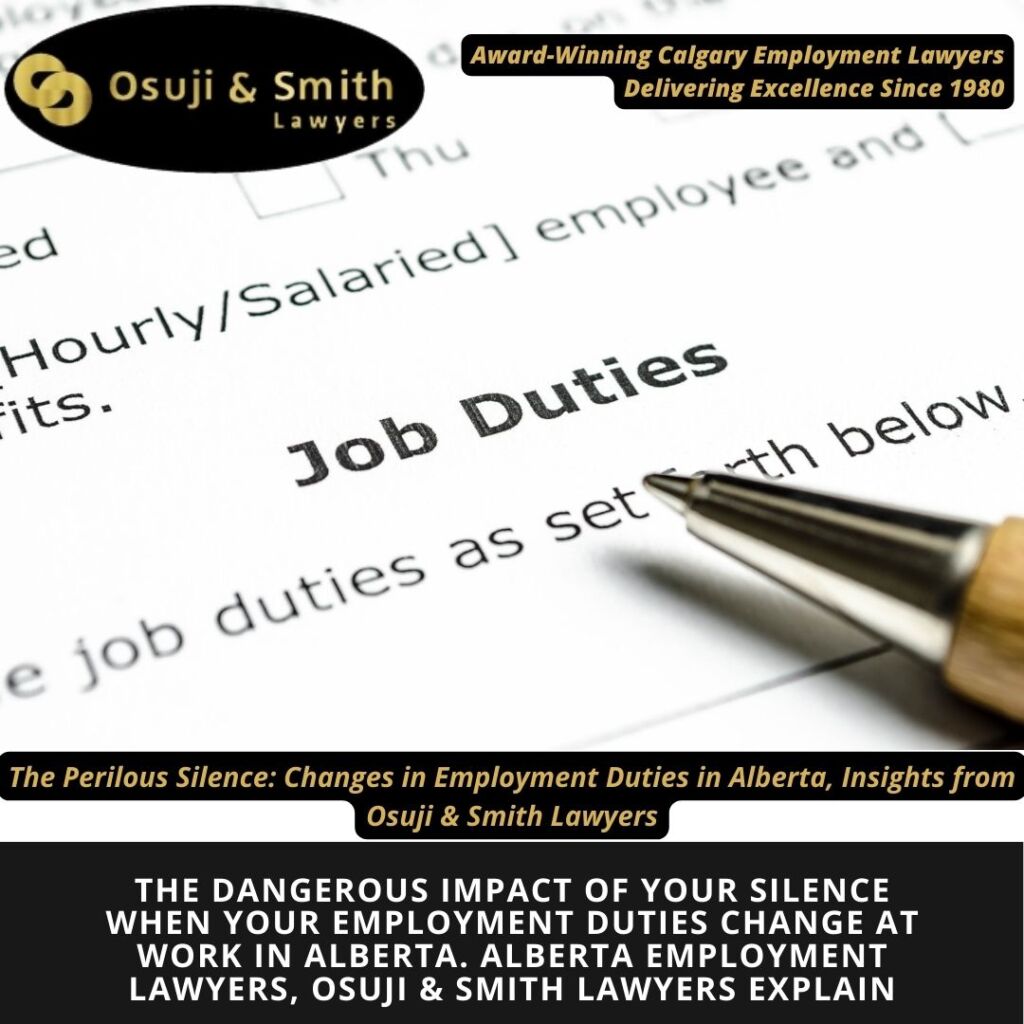The dangerous impact of your silence when your employment duties change at work in Alberta. ALBERTA EMPLOYMENT LAWYERS, Osuji & Smith Lawyers Explain
The Perilous Silence: Navigating CHANGES IN EMPLOYMENT DUTIES IN ALBERTA, Insights from Osuji & Smith Lawyers
In the ever-evolving world of work in Alberta, it is not uncommon for employees to experience changes in their job duties. In Alberta, as in other jurisdictions, these changes are often a sign of organizational shifts, restructuring, market pressures, or new strategic directions. However, a change in an employee’s duties can sometimes be a double-edged sword, representing potential growth on the one hand but introducing uncertainty and legal complications on the other.
According to the esteemed employment law practitioners at Osuji & Smith Lawyers, one of the most perilous reactions employees have when faced with changes in their job duties is silence. Not voicing concerns, failing to understand their rights, or neglecting to seek clarification or assistance can have several dangerous implications for their career, mental health, and legal protection.
Understanding Constructive Dismissal in Alberta:
One primary concern that Osuji & Smith Lawyers often highlight is the concept of “constructive dismissal.” In the eyes of employment law, a constructive dismissal occurs when an employer makes a significant change to a fundamental term or condition of an employee’s employment without the employee’s actual or implied consent.
These changes may include a reduction in pay, demotion, or a drastic change in job duties or responsibilities, which essentially alters the employment contract’s fundamental terms. If these changes are unilaterally imposed without proper dialogue, explanation, or consideration, employees might claim that they have been constructively dismissed.
The danger of remaining silent when these changes occur is that the employee might be deemed to have accepted the new terms or conditions of employment. This acceptance can be inferred from the employee’s conduct (i.e., continuing to work without objection), which may preclude them from later claiming constructive dismissal.

Psychological Impacts and Workplace Stress:
From a humanistic perspective, silence can also be psychologically damaging. When employees do not voice their concerns, they internalize the stress, uncertainty, and dissatisfaction they might be experiencing. This internalization can lead to increased levels of workplace stress, anxiety, and even depression.
The Alberta-based employment law legal experts at Osuji & Smith highlight that an open, communicative approach between employers and employees could alleviate these psychological pressures. Employers are encouraged to engage proactively with their staff, explaining the reasons for the changes, and providing support such as training for new duties or responsibilities.
Loss of Bargaining Power and Career Growth Opportunities:
Career progression often hinges on the ability to adapt, negotiate, and advocate for oneself. When in Alberta an employee remains silent during significant shifts in duties, they may inadvertently place themselves on a career trajectory that they do not desire. They lose the opportunity to negotiate the terms of the change, to seek additional compensation, or to request further career development opportunities.
Osuji & Smith Employment Lawyers often advise employees to be proactive in these discussions, ensuring that changes align with their career goals and aspirations. This dialogue is not about confrontation but about collaboration between the employee and employer to find a mutually beneficial pathway forward.
Legal and Practical Steps to Consider:
The employment legal team at Osuji & Smith emphasizes that employees in Alberta have rights and recourses when faced with changes in employment conditions. Here are practical steps they suggest employees should consider:
Open Dialogue: If your employer alters your job duties, initiate a conversation. Seek to understand the reasons behind the change and express any concerns or preferences you might have.
Document Everything: Maintain a record of all communications regarding changes to your employment, including emails, letters, and meeting notes. This documentation can be crucial if disputes arise later.
Understand Your Employment Contract: Be clear about the terms outlined in your employment contract. If changes are occurring, consider how they align with or deviate from this contract.
Seek Legal Counsel: If you believe the changes to your duties are unreasonable or fundamentally alter your employment terms, consult with legal professionals. Lawyers specializing in employment law, like those at Osuji & Smith, can provide guidance, represent your interests, and help navigate potential disputes.
Mental Health Resources: If you’re experiencing stress or anxiety due to changes at work, consider reaching out to mental health professionals. Your well-being is paramount, and numerous resources can provide support.
In conclusion, while change is an inevitable aspect of the professional landscape, silence is not the safest route when navigating these changes. The employment law specialists at Osuji & Smith Lawyers underscore the importance of communication, self-advocacy, and legal consultation in protecting your rights, well-being, and career trajectory. Being informed and proactive is not just beneficial; it’s essential for modern-day workers facing the fluid dynamics of employment in Alberta.

